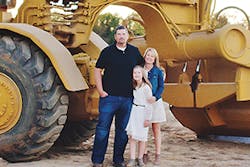Nate Frazee comes from a long line of excavators, going back to his great-grandfather. Unlike many situations in which a family business is formed and passed on from generation to generation, it was the skills—not the actual business—that Frazee inherited from his elders. Each generation has had an independent business. His 80-year-old grandfather Gene—for whom Frazee expresses a great deal of respect—still works an excavator on agricultural sites. Frazee struck out on his own in 2003 when he started Start2Finish Excavating, in Dayton, OH. The company is small—his wife Julie Frazee runs the business while Frazee and another employee do the field work. Frazee hires help for bigger jobs. The company provides excavating services in a one-hour radius to the commercial, residential, and agricultural sectors. The company’s fleet includes two track hoes, two dump trucks, a scraper/pan, a skid loader, a dozer, and a few trailers. Anything else needed is rented through Ohio Caterpillar.
What He Does Day to Day
Because his business is small and he possesses a multitude of skills, Frazee is essentially a jack-of-all-trades. He spends each day estimating, running machinery, doing labor, and being “pretty much the go-to guy,” he says.
What Led Him Into This Line of Work
Frazee, who grew up on a farm, learned excavating skills from his grandfather. He notes that while excavating is in his blood, but what really got his blood pumping toward doing it was after he tried drifting away from it. “I came back to it because it was the only trade I knew that I could make any money at,” he says. “From my grandfather, I learned a lot on how to be productive, how to cut costs but not corners, how to be efficient, and make money.” Time is money, he points out. “You don’t want to go to a job site and play around all day,” he says. “You get out there and make it happen.”
What He Likes Best About His Work
Frazee likes that every job is challenging and a bit different from the others. “You have to evaluate it and think about what would be the best approach,” he says. “You get in, do the work, be efficient, and go on to the next one.” He ensures utmost safety through scheduling. “You don’t want to extend yourself by telling everybody you’re going to be there as far as taking on 10 jobs, and you’re only equipped to handle two or three big jobs.” Another successful strategy is maintaining good relationships with suppliers. Frazee says he keeps them “in check to keep the prices competitive.” Frazee says he’s grateful to have gotten through the recession while other companies shut down operations. He attributes that to a strong work ethic, which generates positive word-of-mouth referrals—and more business. “You have to get relationships with people and keep on bidding work until something comes along,” he says. “A lot of people say we do good work. We might be small on manpower, but being efficient in running the equipment makes up for having five or six guys standing around and not doing anything.”

